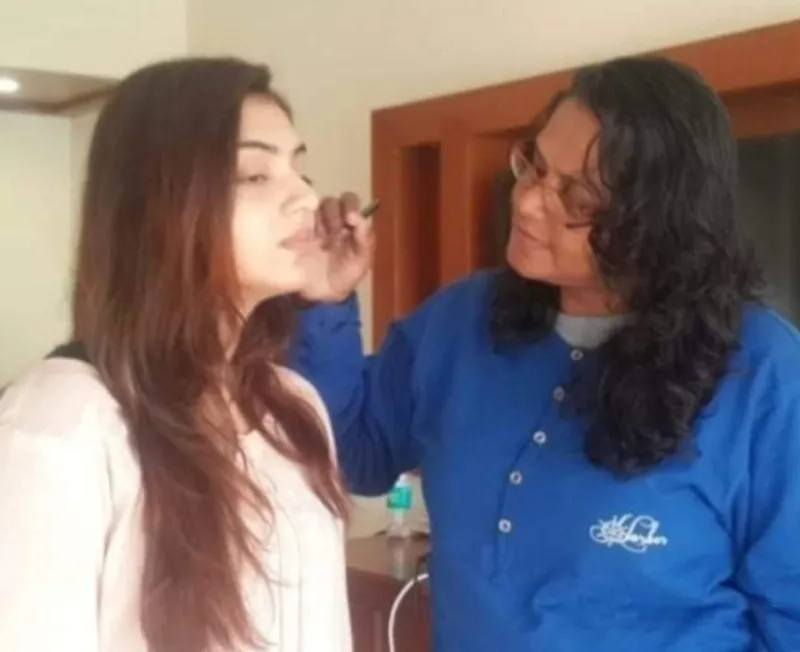Meet the first woman makeup artist to be officially recognised in Malayalam cinema
Twelve years after she was rejected, 37 films, and many challenges later, Mitta Antony has become the first makeup artist in Malayalam cinema to receive membership of the FEFKA Makeup Union.
It took 12 long years and 37 films in different languages for a long overdue recognition to be given to makeup artist Mitta Antony. Last week, she received membership to the Film Employees Federation of Kerala Makeup Union (FEFKA), making her the first woman makeup artist in Kerala to be officially recognised.
A makeup artist to mainstream Malayalam films like Anjali Menon’s Koode and Don Palathara’s 1956, Central Travancore, Mitta applied for the Union’s membership 12 years ago after she completed several courses in makeup artistry and special effects. The sad part was not the rejection, but the line of questioning.

Mitta Antony applying makeup to actor Nazriya Nazim
“When I contacted the FEFKA Makeup Union for membership, they actually asked me how I could apply as I was a woman,” she tells HerStory.
Her first movie was in Arabic, comprising technicians from Mumbai, who asked her to join in projects they were part of. Mitta moved to Mumbai where she understood the scene was no different.
“I tried to contact the Cine Costume Makeup Artists and Hairdressers Association (CCMA), but here too, women were treated as outsiders,” she says.
In 2014, a Supreme Court ruling in the Charu Khurana v Union of India case ruled that prohibiting women from practising as makeup artists and requiring residency for over five years in Maharashtra violated fundamental rights enshrined in the Constitution as well as statutory provisions. The Court directed the bye-laws to be quashed, and the police administration to prevent any harassment of female artists by the Association.
“This was a major victory for makeup artists and allowed me to apply for a membership. I worked on many projects and also learned the art of prosthetic makeup and worked in Bhojpuri, Hindi, Tamil, and Kannada movies,” Mitta says.
Long-due recognition
In 2017, Mitta returned to Kerala and received an offer to work on Udalazham, a film based on transgenders. However, Koode, directed by Anjali Menon, turned out to be both life and career changing for her.
“Till then it remained a nexus that treated women badly because we didn’t have membership of the Union. On my projects, I had assistants who would treat me badly because I did not have a platform for redressal. It was a traumatic experience akin to mental torture. Moreover, the remuneration was abysmal, and at times, I was being paid lesser than my own assistants. I also did not receive any payment for four movies,” she says.
With Koode, Mitta began getting noticed, but that didn’t mean the offers came pouring in. “I didn’t get any mainstream movies after that, only got small ones but I continued working because it was my passion,” she adds.
Disappointed and disillusioned, she decided to quit cinema altogether. Last week, she received a call from B Unnikrishnan of FEFKA to come to the office where she officially received the news that she had been accorded membership of the Union.
“There was pressure from different quarters with the Women in Cinema Collective (WCC) playing a major role; the efforts of Anjali Menon and Sajitha Madathil ensured this recognition,” she says.
People ask her why she remained silent for 12 years, and Mitta has a practical answer.
“It was an unwritten rule of law that women would not be admitted into the Union. If I broke it, then I would not have got any projects or work,” she says.
From childhood, Mitta, a keen observer, and watcher of movies, has been fascinated by the role of makeup in enhancing characters.
“I was bowled over by Kamal Hassan’s characters in films that used the art of makeup for makeovers. I remember watching Mammootty’s Panthanmada and this got me intrigued about makeup and special effects. This curiosity led me join courses in hair and makeup because there was no makeup academy in Kerala then,” Mitta explains.
She followed it with a one-year diploma in makeup artistry and another in special effects.
After completing the required courses, Mitta thought she could apply for a membership. However, that didn’t happen for 12 years.
Mitta believes this recognition is also a game changer.
“While I hope to get more opportunities in Malayalam cinema, I also hope it will change the path for other qualified and skilled women in the field. I am looking forward to more support from the Union and those who work with me,” she says.
Edited by Megha Reddy








